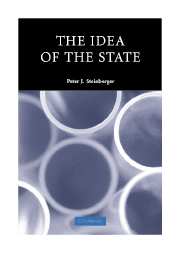2 - Politics, Prudence and Philosophy
Published online by Cambridge University Press: 22 September 2009
Summary
The idea of the state presupposes a strong distinction between prudential and philosophical ways of thinking about politics. The distinction is, to begin with, one of subject matter. Prudential theories of politics pursue questions about policy and government and, where appropriate, non-governmental or quasi-governmental entities, understood as instrumentalities of the state. Philosophical theories of politics, on the other hand, pursue, directly or indirectly, the nature of the state itself, understood as a political or civic community encompassing virtually all facets of organized social life. This difference in subject matter, however, is deeply bound up with larger intellectual differences. For we are in fact talking about two quite distinct manners of thinking, sharply different from one another in terms of goals, methods and standards of judgment. Getting clear about their differences – and also about the ways in which they are closely and inexorably connected to one another, despite those differences – is absolutely crucial in a double sense. It is crucial in thinking about what it might mean to pursue a philosophical theory of the state. And it is crucial in thinking about the state itself, understood as a structure of intelligibility composed of propositions and claims – metaphysical or ontological claims – about how things in the world really are.
This chapter is broadly divided into two parts. Sections 1–3 explore the prudence/philosophy distinction in detail by focusing on the work of Hobbes (though I also look briefly at Plato, Aristotle and Rousseau by way of comparison).
- Type
- Chapter
- Information
- The Idea of the State , pp. 41 - 93Publisher: Cambridge University PressPrint publication year: 2005

